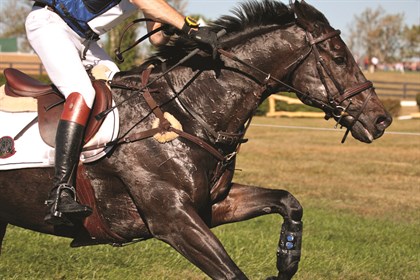
Do horses need both salt and electrolytes?
© KER
Question: I add salt daily to my horse’s diet, do I really need an electrolyte as well?
The major electrolytes in sweat are sodium, chloride, and potassium. Minor amounts of calcium and magnesium are also present, as are miniscule quantities of other trace minerals. Electrolytes are responsible for maintenance of acid-base balance and osmotic regulation of body fluids. Without electrolytes, the body is not capable of maintaining the right amount of fluid in and around cells.
Although body fluid regulation is complex and involves enzymes, hormones, and proteins as well as electrolytes, the basic concept revolves around cell hydration. If cells lose too much water, they die. It is therefore important for the body to have an adequate supply of electrolytes, which means there could be times when supplemental electrolytes should be added to the diet of the horse.
A normal diet of forage will provide some electrolytes to the horse. By feeding a commercial feed (usually containing salt) and giving access to a salt block (or loose salt), a horse's electrolyte requirements will be met under normal circumstances. In fact, the ingesta found in the large intestine acts as a reservoir of electrolytes for the horse to draw upon when needed. However, once the horse starts sweating, whether it is with exercise, travel or exposure to heat/humidity, the reservoir may not be adequate in supplying sufficient electrolytes and, in this case, the horse will benefit from supplementary electrolytes. The quantity of electrolyte needed depends on how much the horse is sweating and for how long. Different horses, sweating for different lengths of time sometimes require different electrolyte solutions.
While providing salt in feed or through access to a salt block is good practice, performance horses often require a little more help to maintain hydration. Electrolyte loss from sweating can result in dehydration. Signs of more severe dehydration are unsteady gait, uncoordinated muscle contractions, trembling, and muscle weakness. The horse may lose interest in drinking even when dehydrated, because when both water and electrolytes are lost, the thirst response (the physiological trigger that tells a horse when to drink) malfunctions. Providing salt only helps to replace sodium and chloride, whereas a good quality electrolyte replacer will also contain potassium, magnesium and sometimes calcium in adequate amounts.
All electrolytes are not equal! When the horse is losing significant amounts of sweat, a high-quality electrolyte replacer can be given.
KER Restore matches the composition of sweat and is sugar free and does not contain any alkalinising agents, making it safe to use during competition. KER Restore should be used in any situation where horses may have sweated including training, travel, racing, competition or during hot weather. KER Restore is available in a powder for everyday use or a convenient paste for occasional use.
As many horses are prone to gastric ulcers, KER Restore Paste includes a buffering agent designed to support gastrointestinal comfort.
It is extremely important to have fresh, clean, free-choice access to water available so that the horse has something to drink when the electrolytes stimulate the thirst response. Electrolytes are only part of the picture of fluid balance. Water is necessary and should not be overlooked when offering salt or electrolyte supplements; ideally, water should be available free choice so that the horse can drink when thirst hits. When horses are reluctant to drink, it is of the upmost importance that owners have a solution up their sleeve to entice them. KER Drink-Up is a scientifically formulated combination of ingredients that work together to increase a horse’s willingness to drink. Research has shown that 90% of horses increased water intake when offered Drink-Up.
The team at Kentucky Equine Research is here to help! If you have any queries about your horse’s diet, electrolyte requirements or have problems getting your horse to drink, contact Kentucky Equine Research’s FREE Nutrition Consultation Service on 1800 772 198 or email advice@ker.com
This article was written in conjunction with KER.
READ THE LATEST NEWS ARTICLES HERE
https://www.equestrianlife.com.au/articles/Salt-v-Electrolytes-Does-my-horse-need-both

